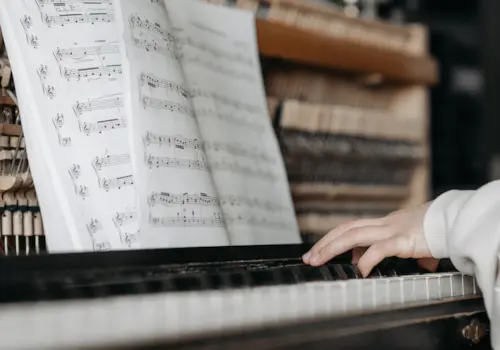Finding a path through the unthinkable is a deeply personal journey - one without a map or a guide.
There are times when the sun is shining, the house is empty, the piano beckons, and music pours out of the fingers like breathing. This article isn’t about those times. This is about practising through days when the diagnosis just got worse, when the divorce papers arrived, when a loved one slides further and further into illness - physical or mental. In other words, this is about practising the piano when life is falling apart.
It’s ironic that the times we need the solace of music the most are frequently the times we find it most difficult to drag ourselves to the piano bench and play. The struggle isn’t theoretical. One pianist friend of mine is battling pancreatic cancer. Another just endured a messy, nightmare-inducing divorce. In my own life, I’m watching helplessly as a close family member is succumbing to several forms of mental illness, the most serious of which is dementia. I know from experience that placing my hands on the keys is only the beginning of the battle; the bigger struggle is learning how to hang on to the lifeline of the notes in the middle of an emotional hurricane.
Here are some ways I’ve found solace at the piano on dark days.
Acknowledge that things have changed and set new goals

Major life upheavals change us. What may have seemed like a good goal in the past may not be the best plan when life is unpredictable. It’s time to ease up. If there’s no energy to pursue certain ambitious plans, postpone them. Most of us don’t do our best playing when our attention and energy is drained. Relax. Let it go. Use practice time to nourish and sooth rather than push toward a big goal. Set a new goal - one made with gentleness and flexibility. For example, my friend who has cancer is planning to play for a couple of events this summer. Both are low-pressure situations. She is performing repertoire that she loves and knows well. Goals give immediate motivation. They give hope. Even if the goal is to play the piece for a friend, it’s a glimmer of light in what can feel like hopeless darkness.
Play music that speaks to you right now

I love playing tangos. I was planning to record a fistful of them. And then a few months ago, my loved one fell apart. I soon learned that no matter how much I tried to discipline myself to stick with my beloved tangos, they were no longer speaking to me. I’m now playing music that pulls me out of the emotional storm and brings me gently back home to myself. How do I know which pieces are right for me during this time? When I’m done practising them (regardless of how badly the practice time went) I walk away from the piano feeling rinsed of darkness and grounded in something bigger than myself.
Find the ideal piece for you in our sheet music store
Chase beauty

Whether it’s the perfection of a musical phrase, the feel of the keys under fingers, the way the light spills across the piano, or even the sound of birds outside the window, beauty is healing and it is everywhere. When we’re happy and relaxed, it comes to us. When we’re grieving or struggling, sometimes we need to stop, breathe, and look for it. Finding these moments of beauty reminds us there’s hope - a whole world of it! - outside the maelstrom of our own thoughts.
Be gentle

Get enough sleep and exercise. Eat nourishing, healthy foods. Slow down however and wherever possible. While at the piano, appreciate every little bit of progress. Screw up (at the piano or in life)? Forgive yourself and move on. Anger and frustration reach a boiling point (again, at the piano or in life)? Feel it, and let it go. Tragedy usually causes people to respond by choosing one of two things: bitterness or compassion. It’s up to us to choose compassion - especially during the times when we feel least compassionate.
Finding a path through the unthinkable is a deeply personal journey - one without a map or a guide. Some days are better than others. But time is teaching me this: all days are made infinitely richer by the piano - a “friend” who absorbs pain, sings with joy, and ultimately reconnects us with hope and with the centre of ourselves.
Read more from Rhonda Rizzo below.
5 tips for surviving (and recovering from) a bad performance
This is why Hanon exercises are a waste of time (and possibly dangerous)







